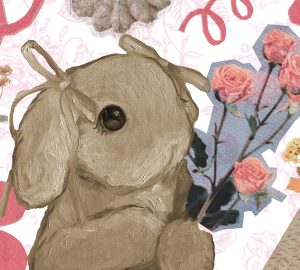Writer’s Corner: “The Seventh Sacrament” by Julia Wood
The Writer’s Corner features poetry, essays, short stories, satire and various fiction and non-fiction from SCAD Atlanta students. To submit your own work for the Writer’s Corner, email features@scadconnector.com.

“The Seventh Sacrament” by Julia Wood
Trigger Warning: suicide, violence, child sexual abuse
“Man shall not lie with young boys as he does with a woman, for it is an abomination,” (Leviticus 18-22).
“Boy molesters will not inherit the kingdom of God,” (1 Corinthians).
Iridescent light shone through the stained-glass windows of Wycliff Cathedral on the second Sunday of Easter, 1989. Blue and purple shadows danced upon the tiled floor as a procession of eight-year-olds entered the vast, grey-brick building. Maria Marino, her palms pressed firmly together in a prayer-like manner, shuffled behind Anna Muzzi, her four-foot-nothing classmate, whose blonde hair was typically fashioned in pigtails, though, on this day she wore her hair down, a white veil covering the crown of her head. Maria wished to pluck every last golden strand from Anna’s misshapen little head until she was left bald and hideous, but she refrained from doing so, reminding herself of how utterly embarrassed her mother would be by her sinful actions.
As Maria continued down the large hall lined with mahogany pews, her head could not keep still. She glanced around at the harrowing statues of Saint Mary and Joseph, the eerie, framed portrait of Sister Jude Agnes, who died in a car accident back in ‘83, and the massive crucifix erected behind the grand marble altar. Her stare held at the wooden fixture, entranced by the ghastly face of a dying Jesus Christ. She tried to pull her eyes away, but something about His sorrowful eyes and familiar brown hair spoke to her; He was just like her: brunette and brooding.
While she focused on the wooden carving, she failed to notice how low Anna’s veil dropped to the ground. Too enticed by Christ, she accidentally stepped upon the girl’s covering, jolting her head back. Anna let out a cry and the procession halted for a moment; the children confused as a sudden outburst had not been a part of their rehearsal the night prior. The parishioners’ faces were blank until Bishop Renaldo stepped out into the apse of the cathedral. He passed the crossing, then sauntered toward the two girls, calm as ever. When he arrived in front of Anna, he outstretched his old, wrinkly hand and lifted the child back to her feet, shooting a sly grin in Maria’s direction before beginning the Mass.
What seemed like hours upon hours passed as she knelt in the pews, incense engulfing her senses in a thick haze. Between dozing off, she watched her brother, Marco, just four years her elder, serve the priest as an altar boy. He fetched and carried, brought up the gifts of the Eucharist and the Holy Bible, and rang the altar bell before Bishop Renaldo sang the Eucharistic hymn.
Finally, the schoolchildren, adorned in their white dresses and black suits, formed a line to receive the Second Sacrament: Holy Communion. Maria was accustomed to taking a sip of her mother’s Barbera during supper, but was nonetheless thrilled to taste the Blood of Christ. As it touched her lips, however, her face puckered in dissatisfaction, for she was simply drinking watered-down grape juice. As she turned to smile for her mother’s Kodak, a bit of red trickled down her chin and onto her perfectly pearl-colored dress, nearly causing a heart attack. She trudged back to her seat, stained dress prominent on most of the film, and searched desperately for her older brother, who always gave her an encouraging smile in times of trouble, but he was nowhere to be seen now that the ceremony had ended. The rest of the Marino family exited the cathedral, along with the other 300 Catholics, and crossed onto North Whitaker Street, where their four-story brownstone awaited their effervescent arrival. But what, rather, who they found hanging from the living room ceiling fan would haunt them forever.
***
In the Winter of 1999, mere days before Christmas Eve, a copy of The Blue Tribune appeared on every porch and driveway in Little Italy, from 3rd and Union to Lovering Avenue. Maria Marino, cheeks red and eyes watery from the frigid temperatures that gnawed at her exposed skin, picked up the plastic-wrapped paper on her walk home from school. She flicked off the wetness from the melted snow with her nylon gloves, wiped her feet on the jute doormat, and stepped inside her home, warmed by the log fire her mother had kept blazing since morning.
“Here’s the latest, Mama,” she said, kicking her shoes off, removing her coat, and sitting on the arm of her mother’s velvet chair that she had kept from the ‘70s. “The Eagles won against the Patriots, but they’re not makin’ the playoffs…”
Flipping the pages, she said, “The Russian election has been declared valid by the Central Electoral Commission… shares are rising in Taiwan, Japan, and Singapore… and the Diocese is…”
Maria’s lungs felt as if they would collapse if she continued reading the article on the center pages.
“What’s going on with the Diocese, Maria?” her mother asked, urging her to continue.
Her eyes burned as tears slipped and landed onto a photograph of Marco, blurring the black and white image. He looked happy, but she cried because she missed him, not having seen that portrait since his funeral ten years ago. The Marinos found themselves living in a perpetual state of mourning from that day onward. Maria herself was too young to understand the gravity of what had occurred, but nonetheless she suffered alongside her family. Her father had not stopped drinking since the funeral reception began and, after eight years of whiskey in coffee cups, his heart decided it had had enough. All that was left was Maria and her mother and the stack of survivors benefits that superseded their loved ones.
“The Diocese is being investigated by the Federal Bureau of Investigation following a slew of suicides in Wilmington. These tragedies are believed to have resulted from years of sexual abuse at the hands of the Archbishop, Jerome Renaldo. A suicide letter allegedly written by Daniel Cera, a 15-year-old altar server at Wycliff Cathedral, states that the Archbishop had not only assaulted him over the course of six years but, to his knowledge, also molested four of his peers… Marco Marino, a former Wycliff altar boy, who committed suicide in 1989, is suspected to be another victim.”
Maria’s mother gasped as she spoke, petrified by the words on the page.
Without hesitation, Maria stood, threw her jacket and gloves back on, tied her shoes, and opened the front door.
“I’m going out for a smoke.”
Snow crunched under her feet as she opened the garage, grabbing a bright red canister and a fresh pack of Marlboro Reds. Tearing the wrapping with her teeth, she pulled out a cigarette, placed it between her lips, and blindly searched through her coat pocket until she felt a frigid Zippo. She lit the cigarette and gazed at the cathedral across the street. She had not willingly stepped foot in that building since she turned eighteen, straying away from the hypocrisy that festered amongst the congregation, but the rage that seethed in her veins carried her to the front door.
Luckily, the entrance was unlocked, and the doors opened with a slight tug. As Maria entered, cigarette lazily hanging from her mouth, she peered throughout the nave, noticing the complete absence of parishioners as her boots loudly echoed each time they smacked the beige tile. As if she were on a mission, she marched straight toward the rectory located in the basement.
“Bishop,” she called out in a sickeningly sweet tone as she started down the stairs, “It’s me. Maria Marino. It seems you were quite fond of my older brother. I’d like to talk to you about him.”
He heard her every word as clear as a blue sky on a summer’s day, but the cowardly clergyman stayed silent in his bed, covering his ears with a pillow like a child frightened by a thunderstorm. The only thing separating the two was a wooden door and a golden doorknob that would not budge. Maria placed the canister next to her feet and pulled a bobby-pin from her hair in attempt to pick the lock, but to no avail.
“Just open the door, Jerome. Let’s have a nice conversation.”
She took one final drag of her cigarette, aimlessly tossed it on the floor, and started to bang her fists incessantly against the door, so much so that they began to blister and bleed. She shouted repeatedly, “Come out, you sick f-ck! You can’t claim sanctuary here! I know what you did! We all know what you did!”
But Bishop Renaldo never came out of that room, no matter how loud she screamed or how hard she hit, and in the end, it made no difference. Maria had made her mind up as soon as she had read the news; she didn’t want him tried and convicted like any common criminal. She wanted him dead.
In a matter of seconds, she bent down, looped her arm through the plastic handle on the red canister, and unscrewed its cap. Then, retracing her steps, she allowed the gasoline to soak into the embroidered rugs, which lined the flooring from the basement to the altar upstairs, and onto the highly flammable pews. All the while, even as the putrid gas burned her nose, she smiled.
The can eventually ran dry, and she opened the steel doors once more, greeted by a cool wind. She stood in the doorway just long enough to light another cigarette, casually puffing the tobacco, discarding it when she had gotten her fix, and ambling on back home to find her mother in the same position as when she had left. Everything had changed, and yet nothing was different.
As she peered out her bedroom window, Maria’s brown eyes glowed bright amongst the darkness as Wycliff went up in flames.





















